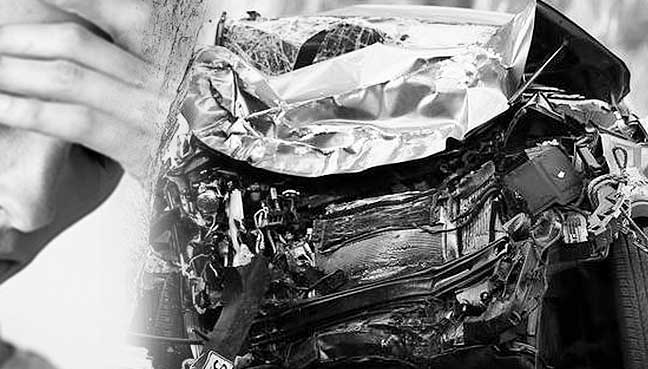Post-call MVA: a real and present danger

Earlier this month we blogged about Post-call accidents in the light of the tragic deaths of young doctors in motor vehicle accidents (MVAs) the day after calls.
The DG did mention it here
We also spoke about the various proposals that would be plausible to improve the oncall system. I am due for a meeting with clinical specialists from MOH hospitals in early August 2015, hence this issue can be brought forth for further discussion. Any improvisation to the oncall system needs to be looked at all angles, including the (i) availability of posts, workforce and resources; (ii) service needs; (iii) continuity of patient care, and; (iv) workload of the particular clinical department. All Head of Departments are asked to use their discretion wisely in distributing the workload without compromising the quality of care, safety of patients & the welfare of their staff. I would like to remind all healthcare professionals that this profession requires passion, discipline, motivation & life-long learning. We are in the best position to help our fellow mankind. We must be clear in what we want & realign our sincere intention of being in this field. We are defined by the choices that we make….
I think I can summarize it as a “we’ll look into it but since you chose to be a doctor, tough luck” statement.
We wondered how common the issue of post-call MVA is so we conducted a little poll in the Dobbs Facebook Group (an active discussion group for Malaysian doctors and the Facebook presence of the Dobbs doctors community).
Out of the 222 in the poll sample, 131 (59%) said they had experienced a post-call MVA as defined by “one which happened within 24 hours after the call ended, and likely attributable to post-call fatigue”. Of this, the majority (54%) were minor but 5% experienced a major MVA (as defined by the car being totally wrecked or if he/she experienced significant injuries).
We could not of course include fatal accidents nor did we include “near misses” and this small survey is naturally subject to non-participation bias. But it does give one an idea that post-call MVA is common and must be taken seriously. Here are some real-life examples given by our doctors:
” I fell asleep at the traffic light few times postcall and the car just roll to the front and bang the car in front ”
“Post call, ride my bike. Hit other cars side mirror. Speeding to nearest R&R. Take a short nap before continue journey to home. Haha”
“Post call Psy UMMC 2009. I knocked on a few skittles at exit to Jln Kuching from DUKE Highway. Alhamdulillah, I woke up midway just about to hit the divider. Me – OK, car – have to repaint.”
” I hit the side of a roundabout and dented my rim. No other serious injuries”
” Yes i did twice. Once in UK, hit the road divider. Once in Malaysia, hit the parking divider. Both times, nodded off for a split second.”
” I hit my husband’s car parked behind mine on my last day of tagging.. goin home at nearly 11.30pm everyday for a week n coming back to work before 6am… His car is a Grand Livina n it still baffles me hw come I could not c d car wen its so huge right behind my car..”
“After a few near misses, My anesth call in hkl was followed by a 4-6 hour sleep in at the on call room post-call…..”
“Had a mild Fender-Bender during a traffic jam in Jln Travers on the way home after 3 days continuous call .Dozed off and was jolted when I rammed into the car in front.Mild damage to the car”
“Major accident. Nearly died.”
Anyway, you get the drift.
Doctors who have a tough call and are sleep deprived should be aware that driving sleep-deprived is as bad as driving alcohol intoxicated! (Ref: Moderate sleep deprivation produces impairments in cognitive and motor performance equivalent to legally prescribed levels of alcohol intoxication)
There was a study in the NEJM on Extended Work Shifts and the Risk of Motor Vehicle Crashes among Interns which concluded:
Extended-duration work shifts, which are currently sanctioned by the Accreditation Council for Graduate Medical Education, pose safety hazards for interns. These results have implications for medical residency programs, which routinely schedule physicians to work more than 24 consecutive hours.
Need we say more? Post-call MVA is a real and present danger to doctors who go on call
What can you as a doctor and what the hospital/MOH should do?
1) Recognise that post-call MVA may happen, particularly if the doctor has had a sleepless call
2) Get a power nap or some shut eye before you drive home
3) Get alternate transport home e.g. someone else (e.g. a spouse) to drive you or a taxi. In the past hospitals used to provide transport home for post-call doctors and perhaps this should be implemented if the MOH is truly concerned about the welfare of doctors who go on-call.
What do you think? Do you agree with our analysis?
Feel free to comment here or in our Doctors Forum
You can join the our Doctors Facebook Group here:
https://www.facebook.com/groups/mydobbs/
and participate in the ongoing poll

